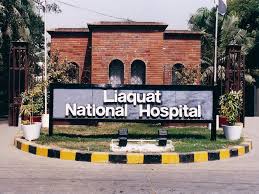“Wrong prescriptions, overdose of medicines, and adverse side effects of drugs, top the list of such errors that took human lives”,
Saddia Mazhar,
ISLAMABAD: Nine-month old Nishwa who was injected wrongly at a local hospital in Karachi, breathed her
last on Monday morning at Liaquat National Hospital. The medical case of the minor girl came
into light on April 14, when she was reportedly administered a wrong injection by the staff of
Darul Sehat Hospital, which resulted the paralysis of Nishwa.
Nishwa faught for her life but left her family for the next journey. The parents of girl said that
her health condition worsened after receiving a wrong dose and her mind was out of order .Her
sisters were calling Nishwa on death Bed to go back to home with them.unfortunatly , again
humanity died and wealth wins, Nishwa’s father said on her death.
The hospital administration said Nishwa had Gestro problem and she was given Potassium
Chloride injection. After this injection her heart beat went high and she felt difficulty in
breathing. After which she was immediately shifted to ventilator .
It Is not the first Incident of its type, “As many as 500,000 people, including women and
children annually die in Pakistan due to medication errors, which include wrong prescription,
overdose of drugs, self-medication and adverse effects of medicines,”said president of the
Pakistan Society of Health System Pharmacists (PSHP).
If we recall During late January 2012, a fake medicine crisis at the Punjab Institute of
Cardiology (PIC) hospital in the Lahore region of Punjab, Pakistan, claimed the lives of over 100
heart patients. According to various reports, the incident involved patients who had been
receiving treatment at the hospital and had been prescribed with counterfeit antihypertensive
medicines.
Pakistan Is a country where patients get treatment in fear of being mishandled. Wrong
prescriptions, overdose of medicines, and adverse side effects of drugs topped such errors that
took human lives.
Sindh Health Secretary deplored that the medication errors including misspelled prescriptions,
look alike medicines and other mistakes committed by the healthcare providers were killing
people while pharmacists hired by the government were not given responsibilities, which was a
governance issue at the hospital level.
In the federal capital a bid to discourage unqualified medical practitioners, the district health
department of Islamabad Capital Territory (ICT) has sealed several fake clinics and registered
cases against concerned persons in recent past. Bilal Awan clinic, Shifa clinic, Falak clinic,
Chohan clinic, Sajjad clinic and Ibrahim Homeo clinic were sealed and the record has been
called for further inspection. The clinics were using substandard drugs and were involved using
open ampoules, a small sealed glass capsule containing a liquid, by injecting non-sterile
injections to patients.
They were also keeping and selling a huge quantity of allopathic drugs without any license,
while Falak Clinic was run by an unqualified ordinary woman who posed herself as a real
doctor.These quacks, having no qualification, established their clinics in different areas of
Islamabad and were playing with the health of innocent people and their only objective was to
mint money..
Muhammad Ishaq Ahmad, a resident of Islambad said there were many who hold the degree of
homoeopathy but are giving patients allopathic medicines, claiming to be allopathic doctors.
Dr Ammara, a medical practitioner said that quackery is one of the leading causes of mortality
and morbidity in the country while unsterilized medical instruments used in checkup processes
are the main reason behind the spread of Hepatitis C.
She claimed that quacks run their clinics in underdeveloped areas, and used antibiotics and
painkillers to give instant relief to patients against a petty amount to making a fool of people.
When contacted, an official of the Pakistan Medical and Dental Council (PMDC) said that the
council has been running countrywide campaigns to stop illegal and unlicensed medical
practices.
“PMDC would continue its efforts to eliminate the menace of quackery which is playing havoc
with the lives of the poor patients,” he added.
WHO( world Health Organisation) reported that “ medical errors are the eighth
leading cause of death in Pakistan and about 7,000 people per year are estimated to die from
medication errors alone.
A number of factors seem responsible for this in Pakistan but the foremost reason is the lack of
accountability”.
Like the government, Pakistan Medical and Dental Council (PMDC) have show-case
rules and regulations that are not implemented properly. Pakistan Medical Association (PMA)
can play an important part in at least starting CME programmes on medical errors more
robustly. An effective regulation by the government and surveillance process in place for all
health care facilities is a matter of utmost importance. Keeping in view a huge number of cases
that are periodically reported by media is alarming
Medical negligence is an act or omission by a doctor in which the care provided was
deviated from accepted standards of practice and cause injury or death to the patient. Medical
Negligence comes under the category of law of tort
Additionally, Section 318 of Pakistan Penal Code 1860 provides that “ Whoever, without any
intention to cause death of or cause harm to, a person causes death of such person, either by
mistake of, act or by mistake of fact, is said to commit Qatl-i-khata.” Whereas Section 304-A
PPC 1860 specifically provides that “Whoever causes the death of any person by doing any rash
or negligent act not amounting to culpable homicide, shall be punished with imprisonment of
either description for a term which may extend to two years, or with fine, or with
both.” Henceforth the victims of medical negligence and their families must lodge F.I.R under
Section 318 and 304-A PPC1860 against the doctors and the administration of hospitals involved
in medical negligence cases.
Even the victims of medical negligence can also file a civil suit in the court for recovery as
compensation and damages under Fatal Accidents Act 1855.

